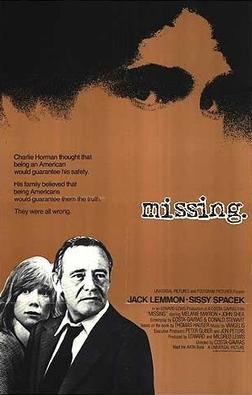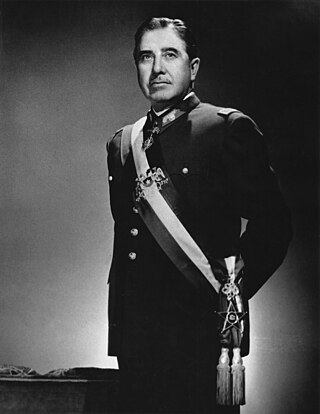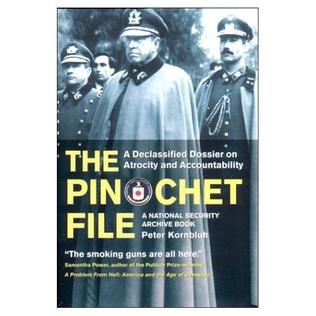
Marcos Orlando Letelier del Solar was a Chilean economist, politician and diplomat during the presidency of Salvador Allende. A refugee from the military dictatorship of General Augusto Pinochet, Letelier accepted several academic positions in Washington, D.C. following his exile from Chile. In 1976, agents of Dirección de Inteligencia Nacional (DINA), the Pinochet regime's secret police, assassinated Letelier in Washington via the use of a car bomb. These agents had been working in collaboration with members of the Coordination of United Revolutionary Organizations, an anti-Castro militant group.

Missing is a 1982 American biographical thriller drama film directed by Costa-Gavras from a screenplay written by Gavras and Donald E. Stewart, adapted from the book The Execution of Charles Horman: An American Sacrifice (1978) by Thomas Hauser, based on the disappearance of American journalist Charles Horman, in the aftermath of the United States-backed Chilean coup of 1973, which deposed the democratically elected socialist President Salvador Allende.

Charles Edmund Lazar Horman was an American journalist and documentary filmmaker. He was executed in Chile in the days following the 1973 Chilean coup d'état led by General Augusto Pinochet, which overthrew the socialist president Salvador Allende. Horman's death was the subject of the 1982 Costa-Gavras film Missing, in which he was portrayed by actor John Shea.
United States intervention in Chilean politics started during the War of Chilean Independence (1812–1826). The influence of United States in both the economic and the political arenas of Chile has since gradually increased over the last two centuries, and continues to be significant.

Robert Scheer is an American left-wing journalist who has written for Ramparts, the Los Angeles Times, Playboy, Hustler Magazine, Truthdig, Scheerpost and other publications as well as having written many books. His column for Truthdig was nationally syndicated by Creators Syndicate in publications such as The Huffington Post and The Nation. He is a clinical professor of communications at the Annenberg School for Communication & Journalism at the University of Southern California. Scheer is the former editor in-chief for the Webby Award-winning online magazine Truthdig. For many years, he co-hosted the nationally syndicated political analysis radio program Left, Right & Center on National Public Radio (NPR), produced at public radio station KCRW in Santa Monica. The Society of Professional Journalists awarded Scheer the 2011 Sigma Delta Chi Award for his column.

The 1973 Chilean coup d'état was a military overthrow of the Popular Unity government in Chile led by the democratic socialist Salvador Allende as president of Chile. Allende, who has been described as the first Marxist to be democratically elected president in a Latin American liberal democracy, faced significant social unrest, political tension with the opposition-controlled National Congress of Chile, and economic warfare ordered by United States president Richard Nixon. On 11 September 1973, a group of military officers, led by General Augusto Pinochet, seized power in a coup, ending civilian rule.

An authoritarian military dictatorship ruled Chile for seventeen years, between 11 September 1973 and 11 March 1990. The dictatorship was established after the democratically elected socialist government of Salvador Allende was overthrown in a coup d'état backed by the United States on 11 September 1973. During this time, the country was ruled by a military junta headed by General Augusto Pinochet. The military used the breakdown of democracy and the economic crisis that took place during Allende's presidency to justify its seizure of power. The dictatorship presented its mission as a "national reconstruction". The coup was the result of multiple forces, including pressure from conservative groups, certain political parties, union strikes and other domestic unrest, as well as international factors.

The Fatherland and Liberty Nationalist Front was a Chilean fascist, political and paramilitary group that fought against the democratically elected Popular Unity government of Salvador Allende, in Chile.

The Government Junta of Chile was the military junta established to rule Chile during the military dictatorship that followed the overthrow of President Salvador Allende in the 1973 Chilean coup d'état. The Government Junta was the executive and legislative branch of government until December 17, 1974, when Augusto Pinochet rose was formally declared President of Chile in late 1974. After that date, it functioned strictly as a legislative body until the return to democracy in 1990.

On September 11, 1973, Salvador Allende, President of Chile, died by suicide from gunshot wounds during a coup d'état led by General Augusto Pinochet, commander-in-chief of the Chilean Army. After decades of suspicions that Allende might have been assassinated by the Chilean Armed Forces, a Chilean court authorized the exhumation and autopsy of Allende's remains.
Raúl Eduardo Iturriaga Neumann is a Chilean Army general and a former deputy director of the DINA, the Chilean secret police under the Augusto Pinochet military dictatorship. He was in charge of a secret detention center known as La Venda Sexy and La Discothèque—because of the sexual abuse inflicted on blindfolded prisoners as loud music masked their screams. An aide to General Manuel Contreras, head of the DINA, he was in charge of several assassinations carried out as part of Operation Condor. He has been condemned in absentia in Italy for the failed murder of Christian-Democrat Bernardo Leighton, and is wanted both in Spain and in Argentina. In the latter country, he is accused of the assassination of General Carlos Prats. He was later found to have played a prominent role in the assassination of Spanish-Chilean United Nations diplomat Carmelo Soria as well.

David Henry Popper was a diplomat and former United States Ambassador to Cyprus (1969–73) and Chile (1974–77). He was a member and former President of the American Academy of Diplomacy.

Augusto José Ramón Pinochet Ugarte was a Chilean army officer and military dictator who ruled Chile from 1973 to 1990. He was the leader of the military junta from 1973 to 1981, and was declared President of the Republic by the junta in 1974 and thus became the dictator of Chile, and from 1981 to 1990 as de jure president after a new constitution which confirmed him in the office was approved by a referendum in 1980. His time in office remains the longest of any Chilean ruler.
Rafael Manríquez was a Chilean journalist, singer, guitarist, composer and producer born in Santiago.
Frank Teruggi, Jr. (1949–1973) was an American student, journalist, and member of the Industrial Workers of the World, from Chicago, Illinois, who became one of the victims of General Augusto Pinochet's military shortly after the September 11, 1973 Pinochet coup d'état against Socialist President Salvador Allende.
Neon Tommy was the online news publication sponsored by the Annenberg School for Communication & Journalism at the University of Southern California. It was active from 2009 to 2015.

The Pinochet File is a National Security Archive book written by Peter Kornbluh covering over approximately two decades of declassified documents, from the Central Intelligence Agency (CIA), Defense Intelligence Agency (DIA), White House, and United States Department of State, regarding American covert activities in Chile. It is based on more than 24,000 previously classified documents that were released as part of the Chilean Declassification Project during the Clinton administration, between June 1999 and June 2000.

Human rights abuses in Chile under Augusto Pinochet were the crimes against humanity, persecution of opponents, political repression, and state terrorism committed by the Chilean Armed Forces, members of Carabineros de Chile and civil repressive agents members of a secret police, during the military dictatorship of Chile under General Augusto Pinochet from 1973 to 1990.
Following the 1973 Chilean coup d'état, an armed leftist resistance movement against Augusto Pinochet's dictatorship developed until 1990 when democracy was restored. This conflict was part of the South American theater in the Cold War, with the United States backing the Chilean military and the Soviet Union backing the guerrillas. The main armed resistance groups of the period were the Revolutionary Left Movement (MIR) and Frente Patriótico Manuel Rodríguez (FPMR), the armed wing of the Communist Party of Chile. These groups had a long-standing rivalry, including over Marxist orthodoxy and its implementation.
Edmund C. Horman was an American businessman who flew to Chile in 1973 in search of his son, Charles Horman, knowing that soldiers had seized him, but unaware that he had been shot dead by the Chilean military forces under General Augusto Pinochet, during their coup against President Salvador Allende.












